In this article:
Peaches (Prunus persica) are a stone fruit native to Europe and North and South America. Historically thought to have originated in China, it grows in varying climates and is consumed worldwide. (1)
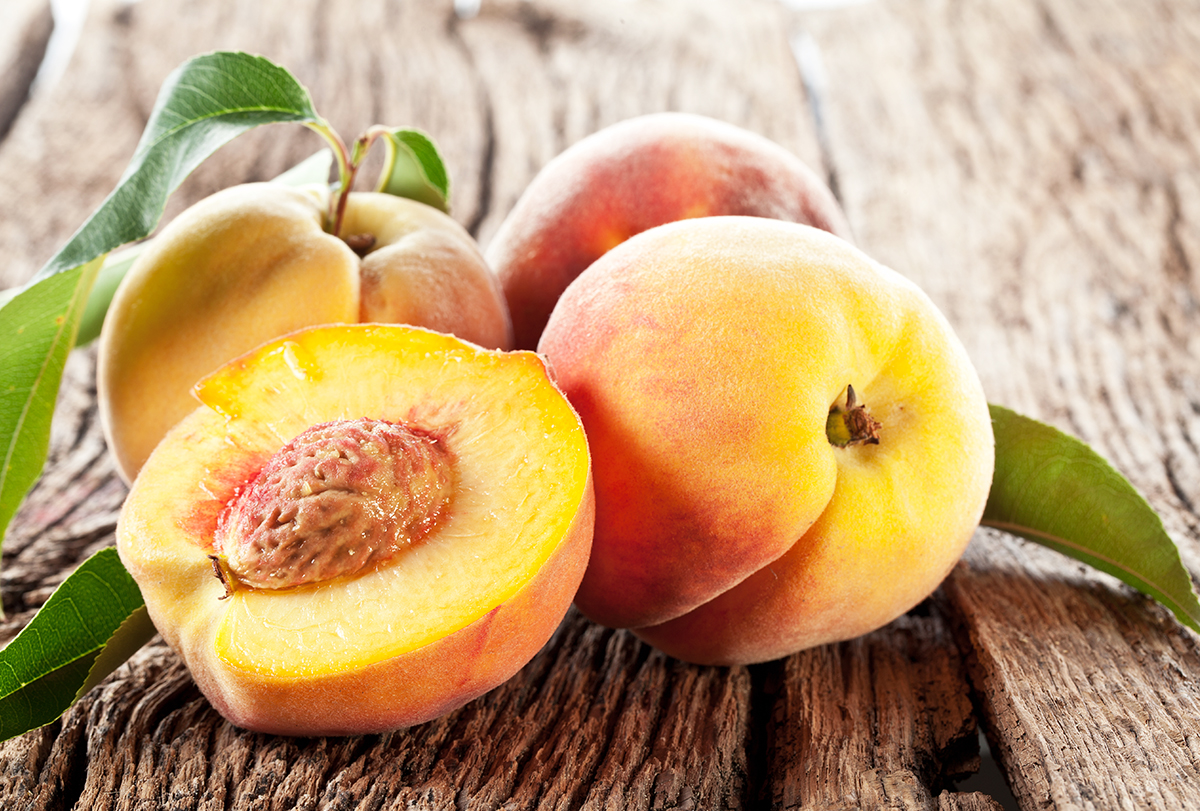
A yellow-orange fruit with a characteristic fuzz on its skin, peaches belong to the same family of fruits as nectarines, apricots, cherries, and Japanese plums.
Peaches are sweet, delicious, and versatile; they are highly valued as they are often processed into jams, preserves, jellies, and juices. Moreover, peaches are abundant in beneficial nutrients that play crucial roles in managing health.
Nutritional Profile of Peaches
One medium-sized peach (150 g) contains 63 calories, 2.3 g of dietary fiber (8% of the daily requirement), and 132.5 g of water, making it a low-density fruit. (2) It is rich in many vitamins including vitamin A (36 mcg) and vitamin B2 (0.047 mg), both contributing to 4% of the daily requirements.
It also contains 1.21 g of vitamin B3 (8% of the daily requirement), 6.2 mg of vitamin C (7% of the daily requirement), 1.1 mg of vitamin E (7% of the daily requirement), and 4.5 mcg of vitamin K (4% of the daily requirement).
This fruit is also replete with many minerals including copper (13% of the daily requirement), potassium (183 mg, 4% of the daily value), and selenium (3.15 mcg, 6% of the daily value). It also provides 3% of the daily requirements for iron, magnesium, phosphorus, and zinc.
Health Benefits of Peaches
Here are some of the health benefits of peaches.
1. Helps with digestion
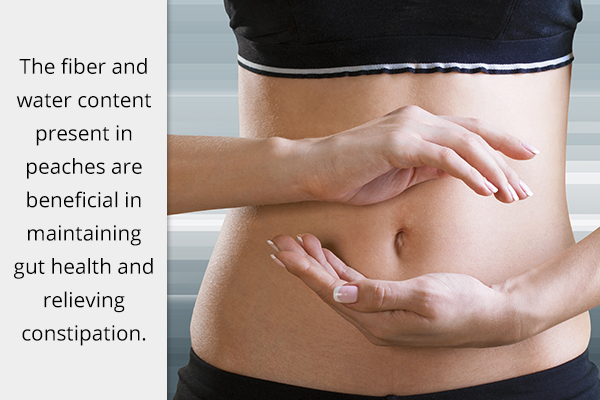
The fiber and water present in peaches are beneficial in maintaining gut health and relieving constipation.
Fiber acts like a prebiotic and food for gut microorganisms. By improving the diversity and quantity of gut microflora, peaches can be beneficial in the fight against many diseases. (3)
Fiber also adds bulk to the stool and aids its passage along the colon. Several studies have reported that including fiber in the diet relieved symptoms of irritable bowel syndrome in children. (4)
2. Keeps the heart healthy
Polyphenol- and carotenoid-rich fruits and vegetables are beneficial for heart health.
In animal studies, peach juice protected rats against changes that cause heart diseases. It reduced cholesterol and inflammatory substances, improved insulin resistance, and managed high blood sugar. (5) It also reduced blood pressure by lowering the hormone that is responsible for causing hypertension. (5)
In a Chinese study, peaches, which are one of the highest sources of flavonoids, reduced triglyceride levels and had a protective effect on the heart. (6)
3. Maintains skin health

Peaches are rich sources of vitamin C, and the role of vitamin C in skin health is not unknown. As a potent antioxidant, vitamin C is responsible for removing free radicals that cause skin damage and aging. It repairs the healthy barrier of the skin and protects it against UV-induced sun damage. (7)
Peaches are rich in ceramides that have an effect on the moisture and permeability of the skin. In studies done on human skin cells, peach-derived ceramides, when consumed by eating the fruit, improved water retention and texture of the skin. (8)
4. Promotes healthy vision
Peaches are full of compounds that improve eye health.
In a study that included African-American women, consumption of 2 servings of peaches per week decreased the odds of developing glaucoma, a condition caused by damage to the optic nerve that leads to loss of vision. (9)
The carotenoids lutein and zeaxanthin, which are present in peaches, are also responsible for reducing the risk of cataracts and age-related degeneration of the eye. (10)
5. May support a healthy pregnancy
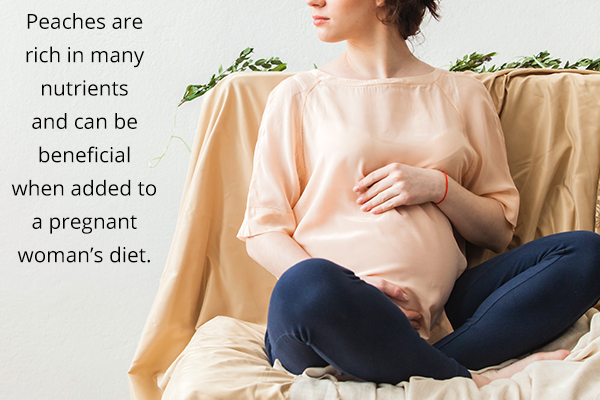
Peaches are rich in many nutrients and can be beneficial when added to a pregnant woman’s diet.
The fiber in peaches can aid in relieving the constipation associated with pregnancy. Moreover, according to studies, a diet sufficiently rich in fiber can lower the risk of pre-eclampsia (high blood pressure at the time of delivery), manage weight gain, and keep blood sugar levels in balance. (11)
The mineral content of peaches, especially the high amounts of copper, selenium, and zinc, is also useful in supporting a healthy pregnancy and preventing heart defects in the baby at birth. (12)
6. May be beneficial for allergies
Histamines are responsible for causing the symptoms of allergies when a person comes in contact with an allergen.
Extracts of peach seeds have been found to inhibit the release of these histamines and reduced the inflammation caused by allergens. (13)
The shell of the peach seed houses an almond-like nut. The extracts of peach seeds are available as a powder and oils. It is advisable to consult a doctor before including these in your diet or the management of allergies.
7. Reduces depression
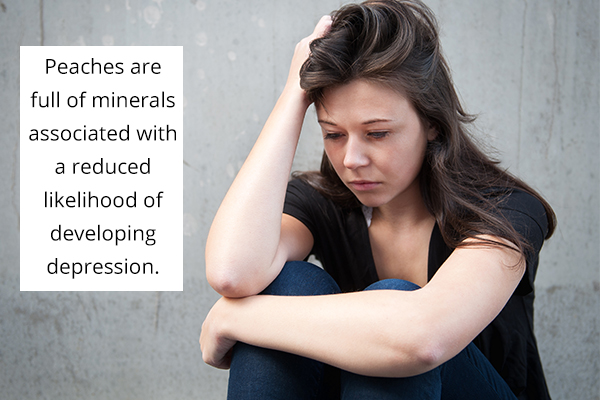
Peaches are full of minerals associated with a reduced likelihood of developing depression.
Copper and selenium, which are abundant in peaches, are associated with positive mental well-being, and reviews of studies have found selenium supplementation to reduce depressive symptoms. (14)
Consuming peaches as part of a healthy balanced diet may therefore be helpful in establishing a healthy state of mental well-being.
8. Boosts immunity
Peaches are also rich in immune-boosting nutrients, such as vitamins A and C, which are actively involved in helping the body fight against infections. Vitamin C improves the activity of white blood cells that combat infections and reduce the duration of illness. (15)
Peaches also exhibit some antibacterial activity and inhibit the growth of candida, a fungus that causes urinary tract infections. (16)
9. May reduce the risk of cancer
The carotenoid and other nutrients in peaches are beneficial in protecting the body against cancer.
The polyphenols in peaches have been found to have a protective role against the growth of breast cancer cells. They target the cancer cells without affecting normal cells and can be a useful adjunct in the fight against cancer. (17) This effect was observed with the consumption of 2–3 peaches a day. (17)
How to Consume Peaches
Peaches are best consumed as a fruit. They are also available as jams, preserves, and jellies. However, the added sugar can be detrimental to your health and outweigh the benefits.
Peaches can also be added to salads or curries for a sweet, tangy taste.
Precautions to Consider
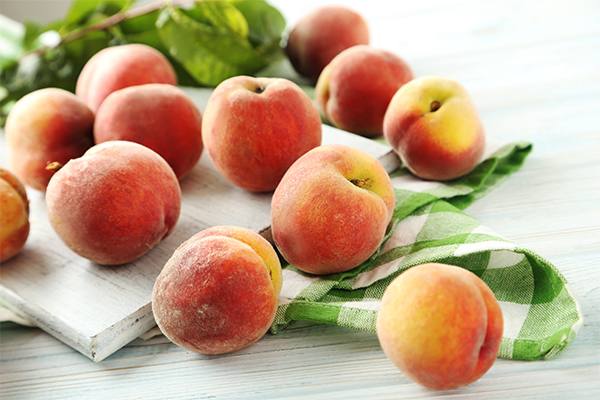
Consider the following precautions when consuming peaches:
- If you are allergic to plums, cherries, nectarines, or other fruits of the same family, you are most likely allergic to peaches. So, be mindful of your consumption of this fruit.
- Do not use peach seed extracts and oils without first consulting a doctor, and always stick to the recommended dosage in the package instructions.
- If you have uncontrolled diabetes, be cautious with fruit consumption and do not eat more than 1 peach per day.
Most-Asked Questions About Peaches
Are peaches good for weight loss?
Peaches have a high fiber and water content, making them a low-density fruit and a great addition to a weight-reduction diet. They improve satiety and feeling of fullness and prevent overeating.
Do peaches help in maintaining blood sugar levels?
Peaches are a good fruit choice for people with diabetes. It is low in calories and has good fiber and water content. (2) Eating 1 peach is not likely to cause a spike in blood sugar levels. However, it is advisable to avoid canned peaches due to their added sugar content.
Final Word
Loaded with beneficial nutrients that also act as antioxidants, peaches are good for heart health, boosting immunity, maintaining eye health, and improving skin texture. It also possesses polyphenols that have a protective effect against certain types of cancers.
Peaches are also packed with nutrients that can alleviate depression. The fruit is beneficial in a pregnant woman’s diet as it improves the health of the mother and prevents the occurrence of birth defects. Consuming peaches as a part of a healthy diet can be very beneficial to your health.
- Was this article helpful?
- YES, THANKS!NOT REALLY


